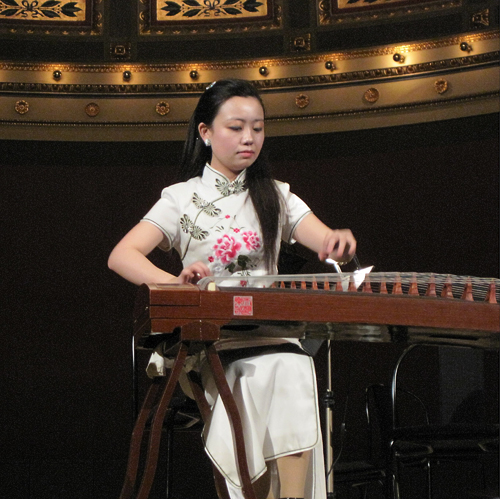While the Chinese New Year may be drawing to a close, the celebrations aren’t over quite yet. The Confucius Institute at Portland State has one more trick up its sleeve. Rounding out a month’s worth of parties, cooking demonstrations and galas, the “Guzheng Lecture and Recital” will be the last event held by the Confucius Institute in celebration of the Chinese New Year.
Ringing out the new year

While the Chinese New Year may be drawing to a close, the celebrations aren’t over quite yet. The Confucius Institute at Portland State has one more trick up its sleeve.
Rounding out a month’s worth of parties, cooking demonstrations and galas, the “Guzheng Lecture and Recital” will be the last event held by the Confucius Institute in celebration of the Chinese New Year.
The Chinese guzheng, a part of the zither family, is believed to be the predecessor of the Japanese kato, Korean gayageum and Mongolian yataga. Using between 21 and 26 strings (most have 21), the guzheng was formerly made of silk but is now usually made with metal or nylon.
The instrument’s shape has remained unchanged over centuries, though playing styles have. While the guzheng is considered a string instrument, unlike the violin it is not played with a bow or a separate piece of equipment, but by plucking with the player’s fingers and fingernails.
Ancient celebrated players had long, well-groomed fingernails that they maintained for years. Modern learners often don artificial nails, made from turtle shells, to play.
The two musicians performing at the event are Hai Bi and Li Ruisi, who were specifically selected by the Confucius Institute.
Bi performed last June at the institute’s annual gala and currently teaches guzheng lessons in addition to being a local artist, according to Meiru Liu, the institute’s director.
Guzheng Lecture and Recital
Friday, March 8, 6:30 p.m.
PSU School of Business Administration, room 490
Free and open to the public
Li Ruisi attended the Central Conservatory of Music in Beijing, whose notable alumni include Tan Dun, composer for the film Crouching Tiger, Hidden Dragon, and Ye Xiaogang, whose composition “Starry Sky” was part of the Olympic opening ceremony in Beijing in 2008.
“It’s the most famous conservatory in China,” Li said.
Currently, Li is studying at the postbaccalaureate level, pursing music performance here at Portland State while her husband works on his doctorate in computer science, also at PSU.
“I also teach the guzheng at Wisdom Arts Academy,” Li said. “I also teach private lessons—not a ton, but just a few. When I lived in China I had more [students], like 20 or 30.”
When asked if she had other hobbies outside playing or listening to music, Li laughed and shrugged her shoulders.
“No, it’s music, making music or even selling it,” Li said. “Selling the CDs and talking to the people are…good way[s] to share this music.”
Li’s portion of the lecture, titled “The Nature and Emotion in Guzheng Music,” will provide “some introduction into the instrument and the different schools and techniques applied to instruments,” Li said.
Li plays both traditional styles, called “North” and “South,” and more contemporary guzheng styles.
“There are subgroups, of course, with these styles,” Li said. “But the North style sounds more speedy [and] exciting, and the tune is strong. The South style is slower [and more] gentle, and the sound quality is very mellow.”
Li said that Bi, her co-lecturer, will cover the history of the instrument and will also play three pieces of his choosing.
The pieces Li is planning on playing—“Spring comes to the Xiang River,” “The Tunes of Qin Mulberry” and “River of Blood,” a concerto with piano—are each inspired by poems that are, in turn, inspired by the instrument itself.
“I want people to know the development of the instrument, the general knowledge of the instrument and the cultural background,” Li said.
This tie between music and culture is exactly what Liu, the institute’s director, wants to communicate to the audience.
“We hope that lots of students, staff and faculty come,” Liu said. “Especially…students studying the Chinese language. This program is a wonderful way to show how music and culture are integral to learning.”
Liu expressed hope that this event would help to gather feedback from the community about how to go about offering guhzeng classes at PSU for credit.
“We want to work with Hai Bi…and get more instruments to begin a teaching course in the guzheng,” Liu said.







